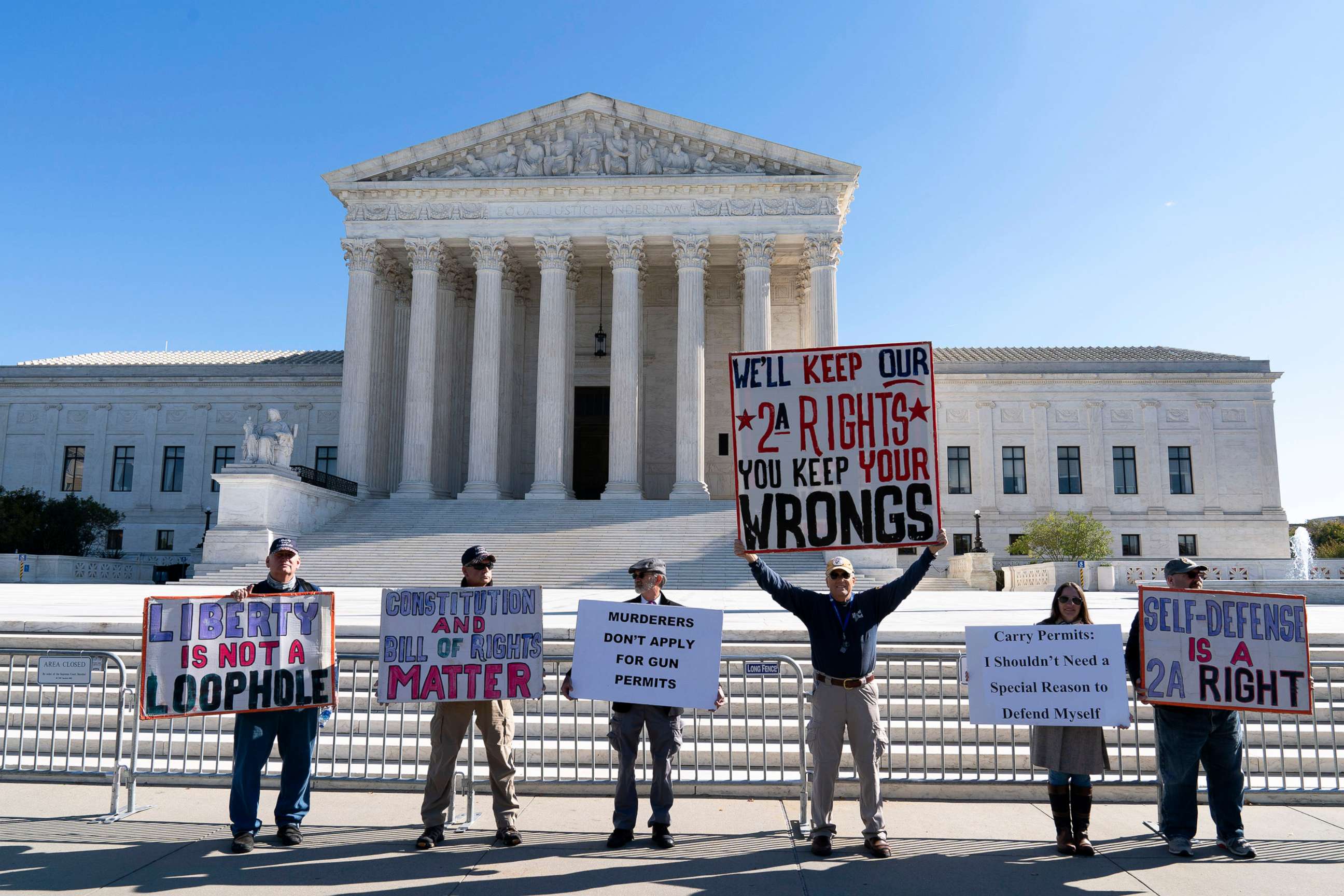
The court ruled to strike down New York's law regulating concealed carry.
June 23, 2022, 11:18 AMIn this Nov. 3, 2021, file photo, demonstrators rally outside the U.S. Supreme Court in Washington, D.C.
Jose Luis Magana/AP, FILEThe Supreme Court struck down a New York gun law regulating concealed carry in one of the biggest gun rights cases in over a decade Thursday.
The closely-watched case, New York State Rifle & Pistol Association Inc. v Bruen, addressed whether New York state's concealed carry law violates the Second Amendment.
It is the most significant case regarding the Second Amendment since the high court affirmed the right to bear arms with its 2010 decision rendering Chicago's nearly 30-year ban on handgun ownership unconstitutional.
"There's been a big push to get more Second Amendment cases before the courts because many people believe that the lower courts were not being faithful to the Supreme Court's decision in 2010 saying that states, as well as the federal government, were restricted by the Second Amendment," Seth Chandler, a professor at the University of Houston Law Center who teaches constitutional law, told ABC News. "The Supreme Court for the past 10 years or so has just not placed that hot-button issue on its docket. But now, with this New York State Rifle and Pistol v. Bruen case, they've accepted those challenges."
Here's what to know:

The case, brought forth by the NRA-affiliate New York State Rifle & Pistol Association, focused on a century-old New York state law that requires gun owners to show "proper cause" to carry a handgun in public for self-defense. Local authorities currently are given the discretion to decide who receives a concealed carry license even if basic requirements are met.
Twenty-five states require a permit to carry concealed weapons in public, according to the Giffords Law Center to Prevent Gun Violence.
Among those, New York is one of eight states, as well as the District of Columbia, that have such "may issue" concealed carry laws. Someone may be denied a permit if, for instance, they have not demonstrated a strong reason to carry a weapon in public.
Seventeen "shall issue" states, meanwhile, issue concealed carry permits with little to no discretion to those who meet basic qualifications. The remaining 25 states generally allow people to carry concealed weapons in most public spaces without a permit, according to the Giffords Law Center.
Gun control advocates like the Giffords Law Center warn that relaxing concealed carry laws could increase the risk of gun violence, while gun rights groups argue that laws like New York's are unfair and overly discretionary.
The court also decided the case at a time when the country has seen record levels of gun violence and gun deaths and a spate of deadly mass shootings that have reignited calls for gun reform, alongside record gun sales.
Ahead of the ruling, experts weighed in on potential outcomes for the case.
During oral arguments on the case in November, many of the court's conservative justices seemed skeptical of New York-style laws, though raised concerns about public safety if restrictions were rolled back too far.
Darrell Miller, a professor at the Duke University School of Law who teaches constitutional law, told ABC News it would be a question of "how narrowly or broadly that opinion is written."
"A really narrow opinion could be something like New York can have a licensing law for concealed carry, but it can't grant as much discretion as it does to the licensing authority," Miller said. "A broad decision on this issue would be something like it's unconstitutional to have any kind of licensing [for concealed carry] at all. I don't think that that's likely, but it's possible."
Miller also said that if the decision rolled back New York's concealed-carry restrictions, the Supreme Court may also need to address decisions on where guns should be prohibited.
"If you end up having more people carrying guns around New York, could you prevent people from carrying guns on college campuses or in the middle of Times Square on New Year's Eve?" Miller said. "If the Supreme Court says we'll have rights to carry guns in more places, that puts a lot of pressure on legislatures and eventually the courts to figure out what places are potentially sensitive that you can prohibit guns from being there."